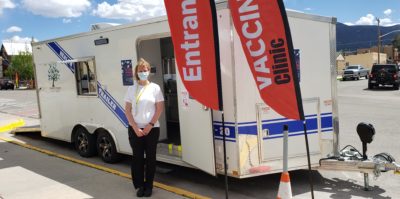This is a weekly Q and A column written by Dr. Lydia S. Segal, M.D. in conjunction with Chaffee County Public Health. This column is focused on questions readers have about COVID-19 news and sciences. As Segal points out, ‘Everything I write today is valid for today. COVID-19 news and science are rapidly evolving, assume updates will be made.”

Tanya Wait, Chaffee County Public Health nurse stands ready to deliver COVID-19 vaccinations in the brand new health trailer May 27 in Salida;s Riverside Park. Merrell Bergin photo.
Recently I have had several conversations with local business owners asking why should they get vaccinated. Several are healthy, eat well, are not overweight, exercise, and are basically never sick even though they have ongoing contact with the public. The thinking is that a strong immune system would likely be able to fight off COVID-19. The belief is the risks associated with the vaccine outweigh the risk of getting COVID. One business owner expressed concerns that the vaccines have ‘poisons or toxins’ in them.
One noteworthy conversation was long but very civil; we listened to each other respectfully. I don’t think either of us changed the other’s mind. This, and other similar conversations got me thinking about some issues that I thought I’d address in this column.
QUESTION: If the risk of getting severe COVID or dying is less than the risk of serious complications from the vaccine, why get the vaccine?
ANSWER: My reading and understanding of the numbers are different and that is based on my COVID resources. The COVID resources we each read are different. I base my medical decisions, guidance, and the answers in these Q & A articles, on the medical and scientific journals that are peer-reviewed. I also read mass media across different perspectives to understand what people in the community are reading.
Some people get their information and make their vaccine decisions after talking with their doctors. This for me is an excellent choice for getting accurate and informed information.
QUESTION: So how do we know if the information we are each reading is accurate and trustworthy?
ANSWER: I want well-designed studies with large sample sizes, say thousands to millions of people in a study, reviewed by a number of different professionals. I want the studies to not be funded by anyone who stands to profit from the research. And if several large studies say a medication or therapy doesn’t work but one says it does, I would be skeptical of the one that is an outlier. (An example would be hydroxychloroquine, which is great for treating malaria and some forms of arthritis, but has not been proven in any large studies to effectively treat COVID-19.)
QUESTION: So back to the question, which is riskier, getting COVID or getting the vaccine?
ANSWER: Understanding the true risk of getting COVID or dying from the disease is actually not simple. Currently, deaths reported by the CDC are reported as total deaths, without looking at whether the people who died were vaccinated or not. One’s risk of getting COVID is different if one is fully vaccinated, or not.
If we want to figure out cases of COVID and deaths related to COVID, we need to look at Israel where they have vaccinated about 6 million people. They have two widely used electronic medical records systems to do data analysis. Six million people is a very large sample size, which is good.
Starting with COVID cases, in the four months of data collected in Israel, 91 unvaccinated people out of 100,000 got COVID. And three out of 100,000 who were vaccinated got COVID. So although there are breakthrough cases (in this example, the three out of 100,000), substantially fewer people are getting COVID if they are vaccinated.
According to the Israeli data, in terms of COVID-related deaths, you are five times more likely to die of COVID if you are not vaccinated.
QUESTION: What about vaccine contents?
ANSWER: Vaccine manufacturers are required to list all ingredients that are in their vaccines. There are no toxins or poisons in the vaccines. There is no metal in the vaccines. There are no microchips in the vaccines.
QUESTION: Should one wait for more testing and real-life experience with the vaccine?
ANSWER: A number of people who are vaccine-hesitant say they want to wait for either more time for the vaccine to be out in the general public or for the FDA to give full approval. The decision to get the vaccine is a personal choice. I firmly believe getting fully vaccinated is the prudent thing to do, and do it now. if one chooses to wait, the next best prudent thing is to mask and social distance. But my personal opinion is that there is no need to wait for more testing and real-life experience.
For more information about COVID and vaccines, eligibility, and appointments, see the links below. Pharmacies will be getting small shipments of vaccines in the near future. Information will be posted online in Ark Valley Voice and on the county public health web pages.
http://chaffeecounty.org/Public-Health-Coronavirus
https://www.hrrmc.com/covid-19-updates/covid-19-vaccine/
Pharmacy vaccine resources:
Salida: Walmart, Safeway, Salida Pharmacy
Buena Vista: City Market, BV Drug, Shavano Pharmacy (LaGree’s) and Valley-Wide Health
If you have questions you would like Dr. Segal to address in a future COVID Q and A column, write to arkvalleyvoice@gmail.com
By Lydia S. Segal, M.D., MPH






Recent Comments